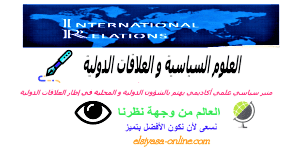 |
| التنبؤ في العلاقات الدولية دراسة في الأدبيات النظرية |
شنيكات، خالد حامد
ستجيب الدراسة عن التساؤل الأساسي الآتي: هل يمكن التنبؤ في العلاقات الدولية في ضوء تطور المعايير العلمية ومناهج البحث وما تنتجه من أدبيات نظرية؟. وتسلط هذه الدراسة الأضواء على الجدل الدائر فيما يتعلق بالتنبؤ في العلاقات الدولية، وإلى أين وصل هذا الجدل؟ وتحقيقاً استخدمت الأسلوب الوصفي والأسلوب التحليلي اللذين يركزان على تحليل القضايا النظرية والجدلية التي يثيرها موضوع التنبؤ، وطرح أمثلة على ذلك من مثل: التنبؤات التي تقدمها الواقعية الجديدة والبنائية وكيفية فهمهما للسياسات الدولية.\\ وتتناول التطبيقات العملية مفهوم التنبؤ في العلاقات الدولية من خلال تحديد أدوات قياس التنبؤ ومؤشراته، والهيكل الملائم لبناء النظرية، ومجالات التطبيق، وترتيب الافتراضات، أو العلاقة بين المفاهيم النظرية، أي إمكانية إيجاد نظرية قادرة على التنبؤ في المستقبل.\\ وخلصت الدراسة إلى أن التغير في هياكل النظام الدولي المستمر يدفع باستمرار إلى استخدام مؤشرات التنبؤ المنهجية؛ لإيجاد حالة من التوازن والاستقرار في البيئة الدولية تحكم فكرة تغليب مفاهيم الأمن الدولي والسلام العالمي، انطلاقا من أن ظاهرة التنبؤ يحكمها البحث العلمي والتكنيكات المنهجية.
Abstract:
In the light of the scholarly standards development, research methods and their implications of theoretical literature, this study aims at answering the focal question suggested here: How far is prediction manifested in international relations? This study also throws light on the ongoing controversy of prediction in the context of international relations. Such debate will be unveiled through descriptive and analytical methods which in turn place an adequate emphasis on examining the controversial and theoretical issues raised by the concern of prediction. Relevant examples in the same context will be also given such as: the predictions suggested by the New Realism, Structuralism, and how far such theories recognize the international policies.\\ The pragmatic implications dwells on the concept of prediction in international relations through identifying prediction's standards and its indications, the appropriate framework to make up theory, implications fields, assumptions prioritization, and the relation between the theoretical concepts to come up with a theory of valid for prediction in the future.\\ The study concludes that the perpetual change of international system's frameworks brings about an urgent use of the methodological signs of prediction to strike a balance and maintain stability in the international environment. Such state of balance gives room for the hegemonic international terms and world peace since prediction phenomenon has been manipulated by scholarly research and methodological tactics.
In the light of the scholarly standards development, research methods and their implications of theoretical literature, this study aims at answering the focal question suggested here: How far is prediction manifested in international relations? This study also throws light on the ongoing controversy of prediction in the context of international relations. Such debate will be unveiled through descriptive and analytical methods which in turn place an adequate emphasis on examining the controversial and theoretical issues raised by the concern of prediction. Relevant examples in the same context will be also given such as: the predictions suggested by the New Realism, Structuralism, and how far such theories recognize the international policies.\\ The pragmatic implications dwells on the concept of prediction in international relations through identifying prediction's standards and its indications, the appropriate framework to make up theory, implications fields, assumptions prioritization, and the relation between the theoretical concepts to come up with a theory of valid for prediction in the future.\\ The study concludes that the perpetual change of international system's frameworks brings about an urgent use of the methodological signs of prediction to strike a balance and maintain stability in the international environment. Such state of balance gives room for the hegemonic international terms and world peace since prediction phenomenon has been manipulated by scholarly research and methodological tactics.
